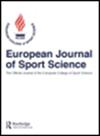Associations of changes in diet and leisure-time physical activity with employer’s direct cost of short-term sickness absence
IF 3
3区 医学
Q2 SPORT SCIENCES
引用次数: 5
Abstract
Abstract Several unhealthy lifestyles are associated with increased sickness absence (SA). This study examined the associations of changes in diet and leisure-time physical activity (LTPA) with employer’s direct cost of subsequent short-term (<10 working days) SA. The survey data from phases 1 (2000−2002) and 2 (2007) of the Helsinki Health Study (HHS), a longitudinal cohort study of initially 40−60-year-old employees of the City of Helsinki, Finland, were linked with SA register data. Final data consisted of 4157 employees. Dietary habits were inquired with a short food frequency questionnaire. Consumption of fruits (F) and vegetables (V) was used to indicate healthiness of diet. LTPA was measured with a series of questions on the intensity and the amount of LTPA. Data on short-term SA and salaries (2008−2012) were received from the employers’ registers. A two-part model was used to analyse the associations. Those who improved their F&V consumption from non-daily to daily and persevered physically active got 620 € (95% CI −1194, −47) lower cost than those remaining non-daily F&V consumers and physically inactive. When examining LTPA only, those who persevered physically active or improved from moderately active to active got 19% less cost for the employer than those remaining inactive. Dietary changes were not independently associated with the cost. Improving employees’ diet and LTPA may reduce employer’s direct cost of SA. Although the associations of diet with SA cost were not statistically significant, improvements in diet may contribute to the beneficial associations of LTPA and employer’s cost of SA.饮食和休闲时间体力活动的变化与雇主短期病假的直接成本的关系
几种不健康的生活方式与病假缺勤(SA)的增加有关。本研究考察了饮食和休闲时间体力活动(LTPA)的变化与雇主随后的短期(<10个工作日)SA的直接成本之间的关系。赫尔辛基健康研究(HHS)第一阶段(2000 - 2002年)和第二阶段(2007年)的调查数据与SA登记数据相关联。HHS是一项对芬兰赫尔辛基市40 - 60岁的初级雇员进行的纵向队列研究。最终数据包括4157名员工。用简短的食物频率问卷调查饮食习惯。食用水果(F)和蔬菜(V)表示饮食健康。LTPA通过一系列关于LTPA强度和量的问题来测量。短期津贴和工资(2008 - 2012年)的数据来自雇主登记册。一个由两部分组成的模型被用来分析这些关联。那些将非日常饮食消费提高到每日饮食消费并坚持体育锻炼的人比那些仍然是非日常饮食消费和不运动的人的成本低620欧元(95% CI - 1194, - 47)。当只检查LTPA时,那些坚持运动或从适度运动改善到运动的人比那些不运动的人为雇主节省了19%的成本。饮食变化与成本没有独立的联系。改善员工的饮食和LTPA可以降低雇主SA的直接成本。虽然饮食与SA成本的关联在统计上不显著,但饮食的改善可能有助于LTPA和雇主SA成本的有益关联。
本文章由计算机程序翻译,如有差异,请以英文原文为准。
求助全文
约1分钟内获得全文
求助全文
来源期刊
CiteScore
6.60
自引率
3.10%
发文量
153
审稿时长
6-12 weeks
期刊介绍:
The European Journal of Sport Science (EJSS) is the official Medline- and Thomson Reuters-listed journal of the European College of Sport Science. The editorial policy of the Journal pursues the multi-disciplinary aims of the College: to promote the highest standards of scientific study and scholarship in respect of the following fields: (a) Applied Sport Sciences; (b) Biomechanics and Motor Control; c) Physiology and Nutrition; (d) Psychology, Social Sciences and Humanities and (e) Sports and Exercise Medicine and Health.

 求助内容:
求助内容: 应助结果提醒方式:
应助结果提醒方式:


